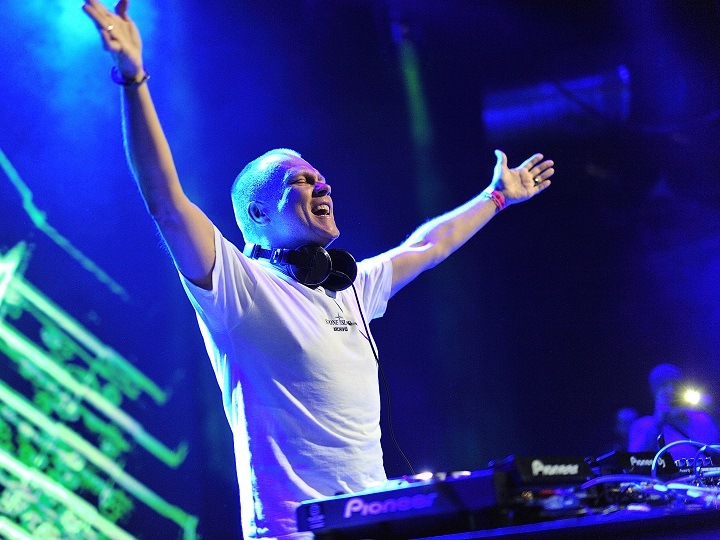DJ Groove is the founder of electronic dance music in Russia. However, he became widely known in Russia as the author of the hit «Happiness is», where the voices of Mikhail and Raisa Gorbachevs sound, the creator of the remix «Office Romance» from the movie of the same name, the author of remixes for songs by Joseph Kobzon and Vladimir Kuzmin, and the first producer of the group «Guests from of the future «. His music sounds in two dozen films, including Down House, Green Carriage, Deadly Illusions, House of Porcelain, Undercover Standup and others … He is also known abroad as EVOORG, and his tracks are played the most famous musicians of the planet, such as Benny Bennasi, David Guetta, Nina Kravitz. At the same time, the musician also works in the downtempo style, and recently released a new album PAINTED.
How did it all start? We mean your DJ career. How did you create music then, where did you get the equipment, how did the audience accept you?
My career began when they listened to pop music in our country, not knowing what electronic dance music was, and all such areas of music were in the underground. And I always tried to be progressive, listened and did what was not mainstream. In St. Petersburg, I met the guys who worked in the studio of the House of Composers, we agreed on the topic of common musical interests and founded the Not Found group, played techno. At night they disappeared at this studio and created their first electronic tracks. DJing started when I got to the «Dance Floor» club, where there were turntables, for which my friends let me play. And it was there that I «caught fire» with this, and spent all my free time there. I learned to play on videotapes: I looked at the recordings of how others work, and tried it myself, and came up with something of my own. The first big performance took place in the St. Petersburg Planetarium club. Emotions, of course, were colossal — it was the first rave, also in the planetarium building. Words cannot convey, when you do your work, a special vibe appears, a connection with the audience, and you are on the same wavelength with everyone who is on the dance floor.
Eugene, you are called the «pioneer» of Russian DJing and electronic music, and your tracks are hits. Do you remember how you “woke up famous” and which track do you consider the most famous?
«I woke up famous» after the release of an album of remixes of songs by Vladimir Kuzmin and an album called «There is happiness.» I remember I turned on the radio to listen to whether my tracks are playing there or not, and I heard a remix of V. Kuzmin’s song «My Love» — it was unforgettable.
In Russia, the first thing that is associated with the name DJ Grove is the track “There is happiness”, and abroad, what is your calling card?
I am known abroad as the EVOORG project. This is Groove in reverse reading. My tracks include in the playlists of my shows David Guetta, Benny Benassy, Armin van Buren, Nicky Romero, Nina Kravitz. In London, at one time all the famous drum & bass DJs played my music.
You often perform abroad, what kind of music material? What major foreign sites did you work on?
After a two-year lull, I hope everything will work again soon. I have probably the brightest memories from London’s Fabric club, as from a venue. Played in Ibiza at El Divino, Privilege, Amnesia, Space. The ideal location is any, the main thing is that there is an audience waiting for your music, your vibe, but what kind of place it is, what city, country, region is not so important. I remember how, after a concert in London, I immediately flew to Riga to play, and everywhere there were equally strong, cool joyful emotions. And all thanks to people!
You are now preparing an album of dance music for the foreign market, which will not be in Russia: where will it be, and why such a policy?
Yes, I really am preparing a techno album, my fellow musicians and participants in the music record market advise to immediately target it to a foreign audience. Because we have no interest in techno music, the broad masses do not know it, do not download, do not listen. And fans of the genre know about new releases all over the world, and with the right placement, they will not lose sight of the album. Plus, obviously, we do not have record labels that deal with electronic music and electronic musicians: therefore, in order to release electronic music, which is more popular in the foreign market, it is more logical and correct to release it with a foreign company. Music preferences have changed a lot in Russia, this can be seen from the charts and selections of digital platforms, there is no need to comment on this, just another generation of listeners is growing, whom TV and social networks are orienting towards a certain direction of music, fashion, hype, etc. But real electronic musicians continue to make techno music despite this. And here’s the paradox: when such albums are released abroad, occupy places in the charts and playlists, they receive more attention in Russia as well. And if you release it modestly here, the album may not even be noticed.
The album is called PAINTED, tell us about it.
I released PAINTED in digital format only. Now is the time when everyone lives in gadgets, and all the music is in our phones and cloud services. I don’t plan to release it on vinyl yet. PAINTED is the third downtempo & lounge album, preceded by «White» and «Black & White» albums. But unlike the previous ones, this one turned out to be more, I’m not afraid of this word, melodic. And if you want to listen to this kind of music, at home or on the road, relax your head and let go of thoughts, take a break from the hustle and bustle — this is what you need. You turn on headphones or a speaker, and you plunge into a state of peace and pleasant thoughts.
Can we say that for the Russian market you work more in duets with show business stars? Is dance music not in demand here?
Collaborations and duets are always an interesting creative story. The dance music that is in demand “here” is incomprehensible for me, as a professional musician, material, and it is difficult for me to comment. I really turn to my friends when I have ideas to make a collab, for example, they recently released the track «Little Sound» with Sergei Burunov, also to remind our dear listener that electronic dance music is alive, and there are such musicians.
How accepted is it in the world of electronic music for DJs to do duets with artists? In world practice, does this often happen, or do DJs try to avoid it?
Collaboration is very common among artists of different genres, it is an interesting experience for any musician, not just a DJ. When you are famous and attract another popular artist, then your track reaches a much larger audience of loyal listeners. I regularly cooperate with my good friends. All this helps, as I said above, to tell the wider masses about the existence of high-quality electronic music.
If in percentage terms, how are your efforts distributed between electronic music, cinema and other areas?
Now, for me, cinema and the creation of music for it are paramount. But in percentage terms, nevertheless, I divide equally between all directions. Now I’m finishing work on the music for the full length «Honest Divorce». This will be the 17th film in which my music sounds like a film composer. Ahead is work on two more new tapes, where I was approved as a composer.
Which DJ do you listen to, respect as colleagues and professionals? Whose performance would you like to go to?
In Russia, I will always visit Fonar’, from the new school this is DJ Light, who works in Garik Burito group. And from foreign countries I would go to everyone I love: dj Terminator X, Public Enemy. These are the people who first of all create their own music, and not just play it.
And who should be studied, listened to by young, novice DJs?
Oh, the list could be endless. I would start with Herbie Hancock, Curtis Blow, Grandmaster Flash, Mix Master Mike, Kraftwerk, The Who’s “Quadrophenia”. Listen to more hip-hop. This is the foundation of all music, not just dance music.
You have been working for more than a decade, and you see how the industry is changing. If you compare DJing today and 10, 20 years ago. What has changed fundamentally?
What has changed is that everything has become available, and that exclusivity that was previously present around this profession, this action, has disappeared. Anyone who has seen how a DJ works in a restaurant / bar can immediately go to courses and, having bought a laptop with a controller, be called a DJ. It used to take years of study and practice to become a DJ, and money to buy equipment. Previously, the equipment was not simplified to such a level (now you don’t need to be able to mix — it’s just a button), it was a matter of talent and skills, and to learn to confidently mix on vinyl — it took months of training, the musical material itself was “worth its weight in gold” — we drove vinyl all over the world, lugged heavy bags to the gigs and gave people new sounds, new tracks that they couldn’t hear anywhere except in gig. I continue to teach people exactly to feel the music, to mix music, not relying on automatic functions on the equipment, but only themselves, with their own ears and hands — otherwise what is the meaning of this profession.
What does a young DJ need to do to become not only known to a wide audience, but also respected by colleagues?
Create as much of your music as possible, and do it in a way that touches hearts. There are really a lot of DJs today, there are few musicians. Today there are no problems with training and technology, but more competition. From the outside it may seem that it is easy to stand behind the turntables, but in reality — for real professionals these are years of study, work in a studio, and gaining experience. As in any profession, you must do this constantly, improve and gain your own unique experience.

